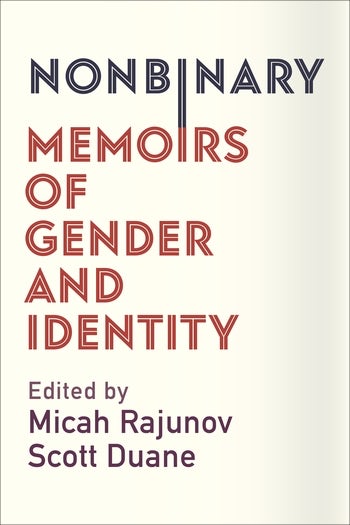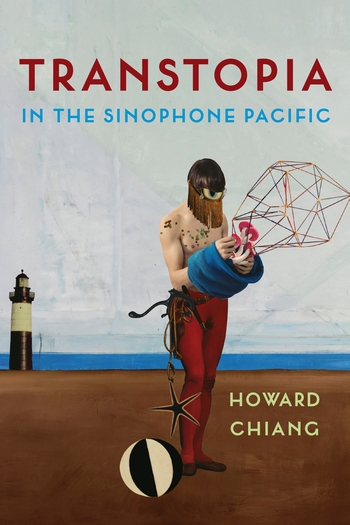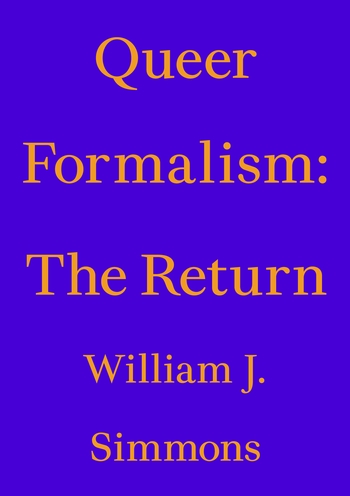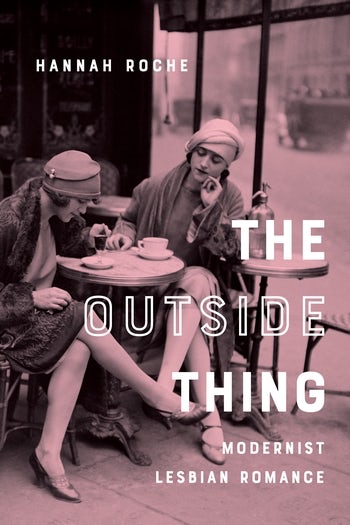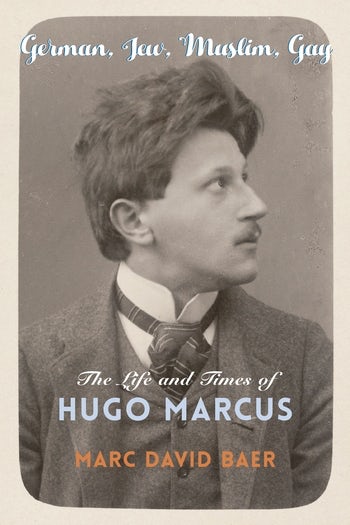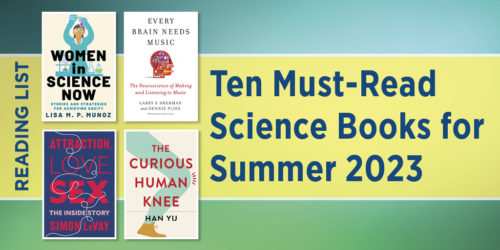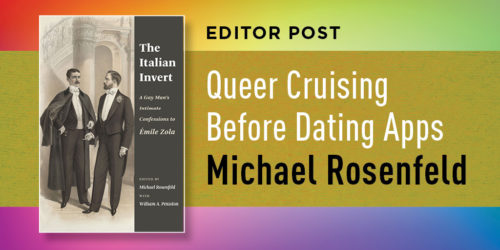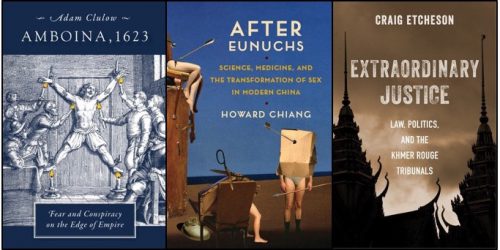15 Must-Read Books for Pride Month 2023

Every June, we come together to celebrate the LGBTQ+ community and carry forward the legacy of the 1969 Stonewall Riots. These 15 books both provide insight into the enduring challenges faced by members of the LGBTQ+ community and explore the beauty and joy found in difference through analyses of queer art, literature, love, sex, and even business.
On Love and Sex
The Italian Invert
A Gay Man’s Intimate Confessions to Émile Zola
Edited by Michael Rosenfeld with William A. Peniston
A daring look into late nineteenth-century queer life, The Italian Invert investigates a series of revealing letters written in the 1880s by an Italian aristocrat, first to novelist Émile Zola and later—after Zola gave the lettersto a doctor who published censored versions in a medical study on “sexual inversion”—to the doctor himself. Michael Rosenfeld and William A. Peniston provide a textual history of the documents as well as analytical essays that place the young aristocrat’s experience within its historical context. Serving as a rare historical queer autobiography, this book gives a voice to the long-buried history of queerness in nineteenth-century Europe. Check out this article by Michael Rosenfeld comparing the aristocrat’s experiences to the modern culture of queer cruising.
Attraction, Love, Sex
The Inside Story
Simon LeVay
Simon LeVay’s Attraction, Love, Sex answers questions and clarifies misconceptions surrounding sex using LeVay’s own work and the work of other researchers—plus a good sense of humor. Exploring both human and animal sexual behavior through biological and psychological lenses, LeVay takes the reader on a journey to discover the wonders of sex. This book shatters conventions and prejudices, using scientific research to create a more holistic view on sex and sexuality. Check out this excerpt from chapter 4, “Sexual Orientation.”
The Fragrant Companions
A Play About Love Between Women
Li Yu
Translated by Stephen Roddy and Ying Wang
Written in 1651, The Fragrant Companions portrays a same-sex relationship in premodern China as two women attempt to overcome several obstacles in order to spend the rest of their lives together. Both comedic and sensitive, this play offers a powerful depiction of romance between two women and serves as an important account of queerness in premodern history. Read this blog post in which the play’s translators, Stephen Roddy and Ying Wang, examine the play’s value as a historical source about love between women.
Beyond the Binary
The Shape of Sex
Nonbinary Gender from Genesis to Renaissance
Leah DeVun
In The Shape of Sex, Leah DeVun gives an account of nonbinary sex in the premodern era, including its prevalence in early Christianity, its erasure at the turn of the thirteenth century, and its return to grace at the dawn of the Renaissance. This book brings to light the obscured history of the concept of nonbinary sex through examinations of works by various thinkers in different fields, including philosophers, lawyers, poets, surgeons, and alchemists. DeVun’s analysis of premodern thought regarding sex and gender creates important context for modern conversations on the same. For more, read this article in which DeVun discusses the complicated history of sex and gender classification.
Nonbinary
Memoirs of Gender and Identity
Edited by Micah Rajunov and Scott Duane
Nonbinary is a collection of stories from people living across the gender spectrum, exploring how varied the experience of gender can be. This book challenges the reader to think beyond the gender binary and to loosen the rigid categories of “male” and “female” as imposed by larger systems, creating room for new narratives of fluidity and difference. The stories told in Nonbinary are groundbreaking and crucial to current discussions of gender and its future role in our society. Read an excerpt from the book’s introduction on issuu.
Transtopia in the Sinophone Pacific
Howard Chiang
Howard Chiang’s Transtopia offers a new model of thinking about transgender history, placing significant emphasis on geopolitics. Chiang dismantles Western-centric paradigms of engaging with transgender history while simultaneously challenging China-centrism in the study of East Asian gender and sexual configurations. Chiang’s concept of “transtopia” acts as a countermeasure against transphobia, presenting an alternative perspective of transgender identity that embraces a diverse range of trans identities throughout history. Read this blog post by Chiang about gender mutability and trans studies in non-Western contexts.
On Queer Art and Literature
Queer Formalism
The Return
William J. Simmons
Queer Formalism is a short, punchy manifesto expanding on William J. Simmons’s 2013 essay “Notes on Queer Formalism,” offering a new way to think and write about queer art. Simmons analyzes important figures in queer art, including Sally Mann, David Lynch, Lana Del Rey, Kirsten Dunst, Lorna Simpson, and Louise Lawler, among others. Check out this interview with Simmons in Cultured Magazine to learn more.
Modernism at the Beach
Queer Ecologies and the Coastal Commons
Hannah Freed-Thall
Hannah Freed-Thall’s Modernism at the Beach theorizes an alternative to common conceptions of the city serving as the generative setting for modernism, presenting instead the idea of the beach as the landscape most connected to modernist art and literature. By examining the works of Marcel Proust, Virginia Woolf, Claude McKay, Samuel Beckett, Rachel Carson, and Gordon Matta-Clark, among others, Freed-Thall presents the modernist beach as a queer refuge. This book weaves ecological theory, queer theory, and feminist theory into a compelling analysis of the modernist movement. Watch Freed-Thall talk about queer ecology at La Maison Francaise of New York University.
The Outside Thing
Modernist Lesbian Romance
Hannah Roche
In The Outside Thing, Hannah Roche seeks to reinterpret the works of Gertrude Stein, Radclyffe Hall, and Djuna Barnes—three lesbian modernist writers—through the lens of literary and affective romance. The Outside Thing investigates the possibility of a space for lesbian writing in a heterosexual romantic literary canon, positing that lesbian writers have daringly and intentionally situated themselves onto the plot of heterosexual romance while refusing to comply with heterosexual traditions. Read this blog post, where Roche discusses romance and the breaking of traditions in modernist lesbian literature.
Doing Time
Essays on Using People
Kristian Vistrup Madsen
Published by Floating Opera Press and distributed by Columbia University Press
A book about prison correspondence, queer intimacy, and the ethics of using others’ stories for art, Doing Time maps Kristian Vistrup Madsen’s reflections on his friendship with an inmate in a California prison. Madsen’s essays range from recollections of encounters with romantic and sexual partners to musings on solidarity, appropriation, and writing itself. Doing Time provides food for thought about the boundaries of fiction and how it can so easily bleed into real life—and vice versa.
Gay Directors, Gay Films?
Pedro Almodóvar, Terence Davies, Todd Haynes, Gus Van Sant, John Waters
Emanuel Levy
In its journey through the lives and works of five contemporary gay male directors, Gay Directors, Gay Films? establishes a foundation for understanding the essence of creating a gay film. Throughout the late twentieth century and beyond, a new wave of openly gay directors emerged, dismantling societal taboos and infusing contemporary cinema and popular culture with profound gay authenticity. Using film critiques and interviews, Emanuel Levy traces an outline of the history of contemporary queer filmmaking—both its successes and the struggles it has faced through decades of conservative backlash. Read the book review in the Bay Area Reporter.
Intersecting Identities
German, Jew, Muslim, Gay
The Life and Times of Hugo Marcus
Marc David Boer
In German, Jew, Muslim, Gay, Marc David Boer conducts an in-depth exploration of Hugo Marcus (1880–1966), a gay German Jew who later converted to Islam, a man who lived at the intersection of varied identities. In examining Marcus’s life, Boer delves into a variety of topics including German-Jewish identity and antisemitism, Islam in Europe, Muslim-Jewish relations, Muslim experiences of the Holocaust, and the struggle for gay rights in the early twentieth century. A biography of a little-known figure, German, Jew, Muslim, Gay sheds light on the interconnected histories of Jewish, Muslim, and gay people and communities during the interwar and postwar periods. Check out this interview with Boer about the book in Notches.
Identity Poetics
Race, Class, and the Lesbian-Feminist Roots of Queer Theory
Linda Garber
Identity Poetics seeks to reconcile the perceived differences between queer theory and lesbian feminism. Favoring an inclusive approach defiant of factionalism, Linda Garber calls for the recognition of the historical role of lesbian poets as theorists of lesbian identity and activism. The importance of this role is most clearly seen in the pivotal work of working-class lesbians and lesbians of color whose articulations of multiple, simultaneous identity positions and activist politics belong to lesbian feminism and also presage queer theory. Garber outlines a history of writing about the lesbian feminist movement—including analyses of the works of Judy Grahn, Pat Parker, Audre Lorde, Adrienne Rich, and Gloria Anzaldúa—and articulates a strong stance against the vilification and erasure of lesbian feminism within the field of queer theory.
Good White Queers?
Racism and Whiteness in Queer U.S. Comics
Kai Linke
Published by transcript publishing and distributed by Columbia University Press
How do white queer people portray our own whiteness? Can we, in the stories we tell about ourselves, face the uncomfortable fact that, while queer, we might still be racist? If we cannot, what does that say about us as potential allies in intersectional struggles? A careful analysis of Dykes To Watch Out For and Stuck Rubber Baby by queer comic icons Alison Bechdel and Howard Cruse traces the intersections of queerness and racism in the neglected medium of queer comics, while a close reading of Jaime Cortez’s striking graphic novel Sexile/Sexilio offers glimpses of the complexities and difficult truths that lie beyond the limits of the white queer imaginary.
On Queer Business
Buying Gay
How Physique Entrepreneurs Sparked a Movement
David K. Johnson
Buying Gay explores the advent of physique magazines—magazines produced by and for gay men that included pictures of nearly naked men alongside articles, letters from readers, and advertisements—in the 1950s and 60s. Created by “physique entrepreneurs,” these magazines served as an initiation into gay culture for many readers . David K. Johnson shows that gay commerce was not a byproduct but rather an important catalyst for the gay rights movement. He also discusses the lives of the producers and consumers of physique magazines, exploring how these magazines provided an outlet for the highly censored and repressed gay community. Read this review of Buying Gay in Publishers Weekly.
Categories:Gender StudiesLGBTQIA studiesPride MonthReading ListTranscript Verlag
Tags:Attraction Love SexBuying GayDavid K. JohnsonDoing TimeEmanuel LevyGay DirectorsGay Films?German Jew Muslim GayGood White Queers?Hannah Freed-ThallHannah RocheHoward ChiangIdentity PoeticsKai LinkeKristian Vistrup MadsenLeah DeVunLinda GarberMarc David BoerMicah RajunovMichael RosenfeldModernism at the BeachNonbinaryQueer FormalismScott DuaneSimon LeVayStephen RoddyThe Fragrant CompanionsThe Italian InvertThe Outside ThingThe Shape of SexTranstopia in the Sinophone PacificWilliam A. PenistonWilliam J. SimmonsYing Wang





